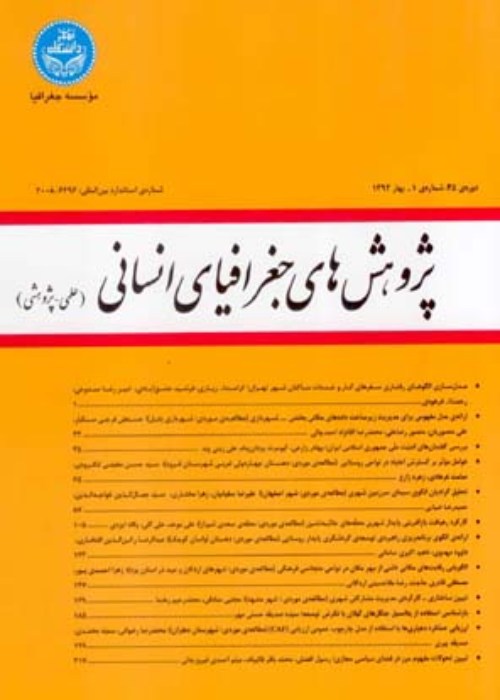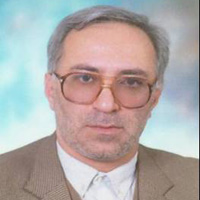Content Analyses of Rural Sustainable Development Position in After Islamic Reveloution Plans
Abstract:
Introduction
Changes in internal and external environment، especially in global arena، including globalization، information society، make constantly rural communities faced with threats and opportunities. Utilization of these opportunities and commuting the threats into opportunities is just possible by a suitable planning. In fact، the vulnerability of rural societies may be resulted from natural and unnatural phenomena (humanity، technical and managemental issues) in economic، social and environmental phases. This may introduce developmental gap among socities and might be resulted from macro planning and management of rural araea. In other words، the developmental gap in rural socities indicates survey lines available in actual situation of rural in macro (national) planning process because of sustainability. This results in a lag of national developmental process based on new paradigm. Therefore، appropriate plans and strategies based on key principles of sustainable development can be effective. By a strategic approach to plans and their flexibility it would be possible to convert threats into opportunity and also introduce sustainable rural development as a purpose of planning for development. The purpose of the plans is to enhance the industrial sector of economy for high technology capable to export، such as the electronics industry، consumer products industry، industrial processing of non-timber forest products، construction materials and chemical industry. Key industrial areas will be established gradually along the main communication routes. The villages will be developed for traditional production with an aim to increase employment and exports. Accordingly، rural managers and planners in different levels of decision making، by continued assessment of macro and micro development plans، could adopt goals and principle of sustainable development with current condition of rural communities. In this framework، evaluation of the position of rural planning in national planning system، based on sustainable development principles and spatial justice in economic، social and environmental dimension over national territory، is inevitable requisite for sustainable rural development management and planning. Methodology
In this paper، we first tried with Descriptive – depletion methodology to extract the principles and theoretical base of rural sustainable development planning and its indicators for content analysis measurement after the Islamic Revolution development plans in Framework of organizational excellence Evaluation model (EFQM). Result of the assessment in this method، by traceing and analysis of strengthes and improving the fields of institute structure (Here is the same village) that suggest improvement of planning process and its function it is possible to modify the future path. The EFQM Excellence Model is a non-prescriptive framework based on nine criteria. Five of these are ‘Enablers’ and four are ‘Results’. The ‘Enabler’ criteria cover what an organisation does. The ‘Results’ criteria cover what an organisation achieves. ‘Results’ are caused by ‘Enablers’ and ‘Enablers’ are improved using feedback from ‘Results’. The Model، which recognises how many approaches to achieving sustainable excellence in all aspects of performance is available، is based on the premise that: Excellent results with respect to Performance، Customers، People and Society are achieved through Leadership driving Policy and Strategy، that is delivered through People. Other criteria are related to result and function. To use this method، there are various ways such as questionnairy method، workshop method، metrix method and preform method. In this paper the questionnairy method have beeb selected. This method is similar to the content analysis method، because based on available document in various fields of empowerment makers this could obtain the results to which access is just posible in ideal condition. Then، 14 questionnaires from 30 designed questionnaires completed by experts and elites in rural development and planning field have been applied as the base of analysis. Results And Discussion
Results of the analyses indicate that consideration to rural sustainable development principles have increased in plans after Islamic Revolution، especially in 4th development plan. But، this attention to sustainable development based on EFQM model، in all dimensions is lower than the average. This fact indicates that enabling factor is not correctly known among policymakers and planners for sustainable institutionalization، and executive management does not have sufficient capacity for sustainable implementation.Keywords:
Language:
Persian
Published:
Human Geography Research Quarterly, Volume:45 Issue: 85, 2013
Pages:
19 to 38
magiran.com/p1174586
دانلود و مطالعه متن این مقاله با یکی از روشهای زیر امکان پذیر است:
اشتراک شخصی
با عضویت و پرداخت آنلاین حق اشتراک یکساله به مبلغ 1,390,000ريال میتوانید 70 عنوان مطلب دانلود کنید!
اشتراک سازمانی
به کتابخانه دانشگاه یا محل کار خود پیشنهاد کنید تا اشتراک سازمانی این پایگاه را برای دسترسی نامحدود همه کاربران به متن مطالب تهیه نمایند!
توجه!
- حق عضویت دریافتی صرف حمایت از نشریات عضو و نگهداری، تکمیل و توسعه مگیران میشود.
- پرداخت حق اشتراک و دانلود مقالات اجازه بازنشر آن در سایر رسانههای چاپی و دیجیتال را به کاربر نمیدهد.
دسترسی سراسری کاربران دانشگاه پیام نور!
اعضای هیئت علمی و دانشجویان دانشگاه پیام نور در سراسر کشور، در صورت ثبت نام با ایمیل دانشگاهی، تا پایان فروردین ماه 1403 به مقالات سایت دسترسی خواهند داشت!
In order to view content subscription is required
Personal subscription
Subscribe magiran.com for 70 € euros via PayPal and download 70 articles during a year.
Organization subscription
Please contact us to subscribe your university or library for unlimited access!



